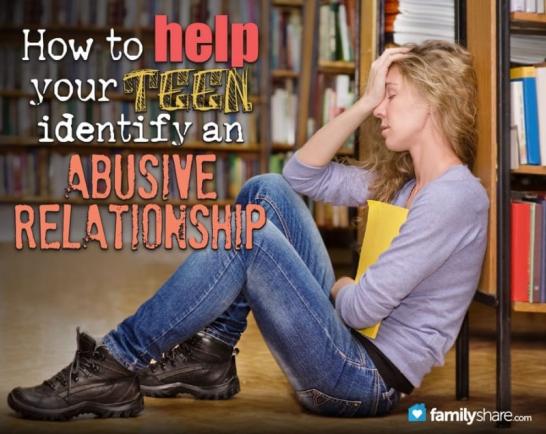
As parents, we teach our children about danger and how to avoid it. Stay out of the road. Don't play with matches. Wear your helmet. This practice becomes especially critical when they begin to date and have relationships. How do we teach our teens about abuse in relationships?
Here are some of the things that contribute to the why of teen abusive relationships
Children learn what they live
An article in the American Journal of Health and Behavior says, "Females who are exposed to their parents' domestic violence as adolescents are significantly more likely to become victims of dating violence than daughters of nonviolent parents." (Noland, VJ, Liller, KD, McDermott, RJ, Coulter, ML, and Seraphine, A E. 2004.)
Lack of awareness
Only one in three teens who have experienced a violent relationship will report it to anyone. Of parents, 81 percent don't believe that teen dating violence is a real issue.
Lack of reporting
Teens don't always understand the laws, particularly those pertaining to confidentiality and so don't report dating violence.
Teaching must begin early
Very young children are beginning to label their relationships as 'dating'. The highest rate of dating violence (three times the national average) is for young women between ages 16 and 24. Violent behavior begins between ages 12 and 18. Those who experience violent relationships as young teens often continue the pattern into adulthood and marriage.
It's more common than you might imagine.
Every year, 1.5 million high school students experience physical abuse from a dating partner. Of U.S. teens, 33 percent have been victims of physical, sexual, emotional or verbal abuse from a dating partner, far exceeding other types of youth violence. Ten percent of high schoolers have been purposefully hit or slapped by a boyfriend or girlfriend. Twenty-five percent of them have been victims of physical or sexual abuse. Seventy percent of college students admit to having been sexually coerced.
How and when do we teach our children about dating abuse?
Teach it before there is a problem
Only you, as a conscientious parent, can determine when is the right time to discuss abusive relationships. Watch for signals and opportunities. Have they discussed concern over a friend's relationship? Perhaps you've watched a television program or movie where there is an abuse relationship and this can be an opportunity to discuss it. Are they discussing interest in the opposite sex? Are they being secretive? Statistics are showing us that we mustn't wait too long before delving into this delicate subject. My suggestion is to pray about it and listen for promptings from God.
What to teach them to watch out for
Most kids aren't taught what defines abuse. They accept some behavior, such as jealousy, as flattering. These are the most common things to be aware of that define abuse in dating relationships. Does he or she:
What are other ways we can fortify our children to lessen their chances of entering into an abusive relationships?
Teach acceptable behavior
Don't teach your daughters that little boys who pick on them secretly like them. Right from the beginning they need to know what behavior is acceptable and what is reportable.
Take your child seriously when she has concerns
Don't belittle what seems to you to be insignificant but might be earth-shattering to her.
Be supportive
Never use phrases like, "I was worried that might happen." or "I told you so." or "I never really liked him."
Listen, listen, listen
Then discuss by asking questions that help your child to reason things for herself. Don't bludgeon her with your years of experience and wisdom. Give her the tools to figure things out and the space and time to do so.
Watch for danger signs
If you see your child is in imminent danger, act rationally and immediately address the issue.
Be there
Reinforce to your son or daughter that you are available any time day or night and then back that up with action.
Set a good example
Do your best to demonstrate a healthy relationship to your children by your own behavior.
Emphasize self-worth
Teach your sons and daughters that they are divine creatures of God and that they are of royal birth and as such, they are entitled to the very best and that it is acceptable to wait for that. There is no rush. Children in abusive dating relationships often wind up with STDs or unplanned pregnancies. It is better to wait.
Support your child in other activities
Keep your child busy with worthwhile things like sports, the arts, church, service, academics and family.
Involve God
Teach your children to pray about their relationships if they have concerns and assure them that God will answer them with truths and wisdom.
Should your child be the victim of a bad dating relationship, there are resources out there such as this one. Seek help immediately. The events surrounding the abuse can lie dormant and fester into significantly worse adult relationships.

